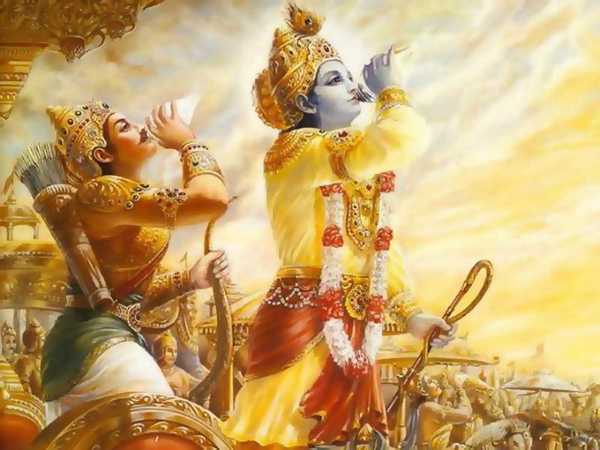Chapter 218

“Markandeya continued, ‘Vrishaspati had a wife (called Tara) belonging tothe lunar world. By her, he had six sons partaking of the energy of fire,and one daughter. The fire in whose honour oblations of clarified butterare offered at the Paurnamasya and other sacrifices, was a son ofVrishaspati called Sanju; he was of great ascetic merit. At theChaturmasya (four-monthly) and Aswamedha (horse) sacrifices, animals areoffered first in his honour, and this powerful fire is indicated bynumerous flames. Sanju’s wife was called Satya, she was of matchlessbeauty and she sprang from Dharma (righteousness) for the sake of truth.The blazing fire was his son, and he had three daughters of greatreligious merit. The fire which is honoured with the first oblations atsacrifices is his first son called Bharadwaja. The second son of Sanju iscalled Bharata in whose honour oblations of clarified butter are offeredwith the sacrificial ladle (called Sruk) at all the full moon(Paurnamasaya) sacrifices. Beside these, three sons of whom Bharata isthe senior, he had a son named Bharata and a daughter called Bharati. TheBharata fire is the son of Prajapati Bharata Agni (fire). And, O ornamentof Bharata’s race, because he is greatly honoured, he is also called thegreat. Vira is Bharadwaja’s wife; she gave birth to Vira. It is said bythe Brahmanas that he is worshipped like Soma (with the same hymns) withofferings of clarified butter. He is joined with Soma in the secondaryoblation of clarified butter and is also called Rathaprabhu, Rathadhwanaand Kumbhareta. He begot a son named Siddhi by his wife Sarayu, andenveloped the sun with his splendour and from being the presiding geniusof the fire sacrifice he is ever mentioned in the hymns in praise offire. And the fire Nischyavana praises the earth only; he never suffersin reputation, splendour and prosperity. The sinless fire Satya blazingwith pure flame is his son. He is free from all taint and is not defiledby sin, and is the regulator of time. That fire has another nameNishkriti, because he accomplished the Nishkriti (relief) of all blatantcreatures here. When properly worshipped he vouchsafes good fortune. Hisson is called Swana, who is the generator of all diseases; he inflictssevere sufferings on people for which they cry aloud, and moves in theintelligence of the whole universe. And the other fire (Vrihaspati’sthird son) is called Viswajit by men of spiritual wisdom. The fire, whichis known as the internal heat by which the food of all creatures isdigested, is the fourth son of Vrihaspati known through all the worlds, OBharata, by the name of Viswabhuk. He is self-restrained, of greatreligious merit, and is a Brahmacharin and he is worshipped by Brahmanasat the Paka-sacrifices. The sacred river Gomati was his wife and by herall religious-minded men perform their rites. And that terriblewater-drinking sea fire called Vadava is the fifth son of Vrihaspati.This Brahmic fire has a tendency to move upwards and hence it is calledUrdhvabhag, and is seated in the vital air called Prana. The sixth son iscalled the great Swishtakrit; for by him oblations became swishta (su,excellently, and ishta, offered) and the udagdhara oblation is alwaysmade in his honour. And when all creatures are claimed, the fire calledManyauti becomes filled with fury. This inexorably terrible and highlyirascible fire is the daughter of Vrihaspati, and is known as Swaha andis present in all matter. (By the respective influence of the threequalities of sattwa, rajas and tamas, Swaha had three sons). By reason ofthe first she had a son who was equalled by none in heaven in personalbeauty, and from this fact he was surnamed by the gods as theKama-fire.[65] (By reason of the second) she had a son called the Amoghaor invincible fire, the destroyer of his enemies in battle. Assured ofsuccess he curbs his anger and is armed with a bow and seated on achariot and adorned with wreaths of flowers. (From the action of thethird quality) she had a son, the great Uktha (the means of salvation)praised by (akin to) three Ukthas.[66] He is the originator of the greatword[67] and is therefore known as the Samaswasa or the means of rest(salvation).'”




